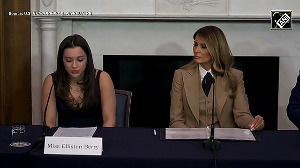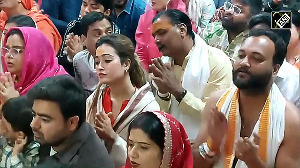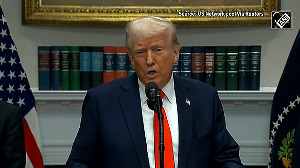In an effort to provide some help to over 10,000 children who lost both their parents to Covid-19, the Supreme Court on Wednesday directed all state governments to reach out to those kids and pay them compensation.

The apex court, which was annoyed over the non-disbursal of Rs 50,000 ex-gratia to the kin of those who lost their lives due to Covid-19, pulled up the state governments and summoned the Andhra Pradesh and Bihar chief secretaries virtually to seek explanation during the course of the day.
It also issued a show cause notice to Andhra Pradesh Chief Secretary Sameer Sharma as to why contempt action be not initiated against him for non-compliance of top court's earlier order on disbursal of claims.
A bench of Justices M R Shah and Sanjiv Khanna took note of the submissions of petitioner Gaurav Bansal and advocate Sumeer Sodhi, appearing for intervenors, that over 10,000 children have been orphaned due to Covid and other reasons since the start of the pandemic and they be compensated.
”It is stated that in the entire country as per the information uploaded on Baal Swaraj portal (of NCPCR), approximately 10,000 children have lost their both the parent or a surviving parent. It will be very difficult for them to make their application or submit the claim for compensation.
"We direct the concerned states to reach out to those children, who have lost both their parents and whose particulars are already uploaded in the Baal Swaraj portal and so that the amount of compensation can be paid to them,” the bench said.
”We also direct the concerned states to share the full information/particulars with regard to the number of deaths recorded by the concerned states as well as the particulars/information uploaded in Baal Swaraj portal to the concerned state legal service authority,” it added.
The bench said it would pass a detailed order by Thursday.
The apex court was hearing a batch of pleas by Bansal and intervenors, seeking ex-gratia assistance to family members of Covid-19 victims.
The bench noted from the chart submitted by Additional Solicitor General Aishwarya Bhati, appearing for the Centre, that majority of the states have rejected number of claims and gave example of Gujarat (4,234), Maharashtra (49,113), Tamil Nadu (10,138) and Telangana (1,489).
”The reasons for rejections may be due to incomplete form or particulars. We direct all concerned states that wherever the claims are rejected the reasons for rejection must be communicated to the concerned claimants and they may be given an opportunity to rectify their applications,” the bench said.
”We also observe that no claims shall be rejected on technical ground and if there are any lacunae in the application, an opportunity shall be given to the concerned claimants to rectify the mistakes, so that the concerned persons be paid the compensation,” it said.
The top court added that such particulars of the rejections shall be sent to the applicant as well as the concerned grievance redressal committee (constituted as per the earlier order passed by this court) within a week from Wednesday.
In the post-lunch session, both Andhra Pradesh Chief Secretary Sameer Sharma and Bihar Chief Secretary Amir Subhani were present virtually.
Senior advocate R Basant, appearing for Andhra Pradesh along with standing counsel Mahfooz A Nazki updated the figures, which were already given and said that the state has received 41,292 applications for claims out of which 34,819 are found to be eligible.
He said that approximately 6,400 cases have been rejected and out of the eligible claimants 23,835 have received the compensation and 10,984 claimants are to be paid, out of which 5,141 have been cleared and payments will be made within three days.
Sharma assured the bench that he would personally monitor the disbursal of claims and 6,400 cases which have been rejected will be suo motu reviewed, and if it is found that the cases are rejected due to insufficient information/ document, the field officers shall reach all those claimants and give them opportunity to remove the defects.
The bench recorded the submission and noted, ”The chief secretary of Andhra Pradesh has assured the court that the state shall ensure that not a single claimant who is eligible to receive the compensation shall be deprived of the compensation and all efforts shall be made to reach to them and compensation is paid. We trust and hope that the chief secretary will abide by the above stand by what he has assured before the court”.
Similar assurance was given by Bihar Chief Secretary and advocate Abhinav Mukerji, appearing for the state government, said that out of 13,250 deaths recorded, 11,095 claims have been disbursed.
He said the state government is paying Rs 4.5 lakh as compensation to kin of a person who lost his life to Covid and no other state is paying that much compensation.
The bench said that compared to other states the applications/ claims which have been received by Bihar can be said to be on the lower side and looking at the peculiarity of the state, more efforts are required to be made to reach out to the eligible persons/kin/family members of persons who have died due to Covid-19.
The top court also pulled up Kerala, Gujarat, Maharashtra, Telangana and Jharkhand for their low number of disbursals of claims.











 © 2025
© 2025